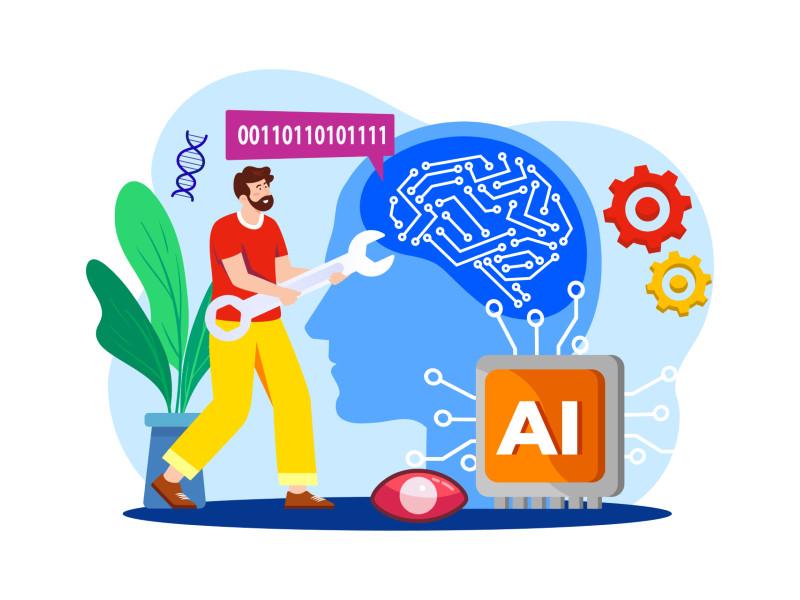Introduction
Artificial Intelligence (AI) – it’s a term that is increasingly becoming commonplace in our everyday lexicon. With its transformative influence on a myriad of sectors, AI’s disruptive capabilities are impossible to overlook. While the intersections of AI with healthcare, finance, or education may seem quite evident, it has also begun to redefine an industry that may initially seem detached from such high-tech developments – Real Estate. This blog aims to elucidate AI’s increasing influence on the real estate sector and highlight the possibilities for the future.
As students and academics, our job is to stay ahead of the curve, critically evaluate these technological trends and understand their implications for the future. With this post, we aim to provide an evergreen, narrative overview of AI’s role in the world of real estate. By doing so, we can gain a deeper understanding of how technology and industry practices co-evolve and what this means for the future of the real estate sector.
Join us on this exploratory journey, as we peel back the layers to reveal the role of artificial intelligence in real estate, its revolutionary impact on the industry, and what the future might hold.
AI and Real Estate
As with many other industries, artificial intelligence is becoming increasingly integrated into the real estate sector. AI technology, from machine learning to predictive analytics, is revolutionizing the way real estate businesses operate and the manner in which properties are bought, sold, and managed.
In real estate, one of the most prevalent uses of AI is in property search and discovery. Platforms like Zillow and Trulia are using AI to improve their property recommendation engines, providing users with more accurate and personalized property suggestions based on their preferences and search history.
Maximize your online impact with Pixels Web Design’s tailored landing page services, designed to captivate your audience, boost conversions, and fuel your business growth.
Defining the Role of AI in Real Estate
Artificial intelligence in real estate is a multi-faceted tool with various applications ranging from property valuation and predictive analytics to customer service and property management.
At its core, AI helps real estate businesses make sense of the vast amounts of data they deal with daily. AI algorithms can analyze these datasets to provide valuable insights that can guide decision-making. This could involve predicting property prices, identifying lucrative investment opportunities, or even detecting fraudulent transactions.
One key area where AI is proving particularly beneficial is in real estate valuation. Companies like HouseCanary are leveraging AI to automate property appraisals, generating accurate and objective valuations based on a wide array of factors.
Which of the following industries commonly requires data entry tasks?
How AI is Revolutionizing the Real Estate Industry
Artificial intelligence is not just a trendy buzzword in real estate; it’s an influential game-changer that is driving significant transformation in the industry. AI’s ability to process and interpret vast data sets is reshaping many aspects of the real estate industry, including property search, valuation, investment, and property management.
For instance, AI-powered chatbots are being used to enhance customer service in real estate. These chatbots can handle customer inquiries round the clock, providing instant responses and facilitating seamless interactions. Structurely offers an AI-powered real estate assistant, “Holmes,” which can converse with prospective clients, qualify leads, and schedule appointments, allowing real estate agents to focus on other critical tasks.
Moreover, AI is being used to enhance property search and discovery. Advanced AI algorithms can analyze a user’s search behavior, preferences, and interactions to provide personalized property recommendations. This not only improves the user experience but also increases the likelihood of a successful transaction. RealScout is one such platform that offers an AI-driven real estate search engine that tailors its property suggestions to the individual user’s preferences.
Artificial Intelligence A Modern Approach
Unveiling the ultimate guide to the dynamic world of artificial intelligence – Artificial Intelligence: A Modern Approach, 4th Edition. Revel in the richness of updated content, designed to propel your understanding of AI into the future. This expertly curated edition not only explores, but also breathes life into the extensive realms of AI.
Experience AI like never before, with our expansive coverage on the state-of-the-art technologies. Unify your understanding of AI concepts, enhanced and refined for intuitive learning. Dive deep into machine learning, bask in the intricacies of deep learning, and voyage through the fascinating dimensions of transfer learning.
Explore the grandeur of multiagent systems, and the mesmerising world of robotics. Engage with natural language processing and understand causality, all while navigating the expanse of probabilistic programming. At the core of our new edition is the commitment to responsible AI, with comprehensive discourse on privacy, fairness, and safe AI.
Artificial Intelligence: A Modern Approach, 4th Edition is your passport to the future of AI. Embark on this thrilling journey and discover the limitless possibilities of what you can accomplish with AI.
AI in Property Management: A New Era
Artificial Intelligence is ushering in a new era in property management. By automating various aspects of property management, AI is increasing operational efficiency, reducing costs, and improving service quality.
AI-powered property management systems can automate routine tasks such as rent collection, maintenance requests, and tenant screening. This not only frees up time for property managers but also reduces human error. Companies like AppFolio provide AI-driven property management software that offers these capabilities and more.
Property maintenance is another area where AI is making a significant impact. AI can analyze maintenance data to predict potential issues before they occur, enabling property managers to address them proactively. Furthermore, AI can also help in managing energy usage in properties, thereby reducing energy costs. Enertiv is a company that offers AI-based solutions for property maintenance and energy management.
AI can also improve tenant experience in managed properties. AI-powered chatbots can provide instant responses to tenant inquiries, and smart home technology can enhance the living experience for tenants. For instance, Google Nest uses AI to optimize heating and cooling in homes based on the occupants’ habits and preferences.
Moreover, AI is helping to make the leasing process more efficient and transparent. AI can analyze prospective tenants’ information to assess their suitability and risk level, thereby helping property managers make informed leasing decisions. LeaseLock is a platform that leverages AI to provide a more efficient and secure leasing process.
The Impact of AI on Real Estate Investment
In the world of real estate investment, Artificial Intelligence is increasingly becoming a vital tool. By providing in-depth market analysis and predictive insights, AI is helping investors make more informed and profitable investment decisions.
AI can analyze various data points, including market trends, property prices, neighborhood demographics, and economic indicators, to predict property values and identify lucrative investment opportunities. Companies like Skyline AI offer AI-driven investment platforms that provide these capabilities.
Furthermore, AI can also help investors manage their real estate portfolios more efficiently. AI can monitor portfolio performance, provide real-time updates, and generate predictive insights to guide portfolio management strategies. Cashboard is a robo-advisor that uses AI to provide personalized investment advice and portfolio management services.
The Future of AI in the Real Estate Sector
Artificial Intelligence is set to play an increasingly central role in the future of the real estate sector. As AI technologies continue to evolve, they will enable more advanced applications and bring about further disruption in the industry.
In the future, we can expect to see more widespread adoption of AI in real estate, with AI becoming an integral part of every stage of the real estate transaction process, from property discovery to transaction completion. Furthermore, as AI becomes more sophisticated, it will enable more accurate property valuations, more personalized property recommendations, and more efficient property management.
Another exciting possibility is the use of AI in conjunction with other emerging technologies such as blockchain and virtual reality. For instance, AI could be used to analyze blockchain data to verify property transactions, or AI could power virtual reality property tours, providing a more immersive and personalized property viewing experience.
Conclusion
Artificial Intelligence has proven to be a potent catalyst in the evolution of the real estate sector. By enhancing operational efficiency, improving customer service, and facilitating data-driven decision-making, AI is reshaping the real estate industry.
As we look towards the future, it is clear that the role of AI in real estate is not just a passing trend but a fundamental shift in how the industry operates. While the full potential of AI in real estate is still unfolding, what is clear is that the integration of AI will continue to drive innovation and transformation in the sector.
For academics and students alike, understanding the implications of these shifts is crucial. As the landscapes of technology and industry continue to intersect, staying informed about these trends can not only provide a richer understanding of the present but also yield insights into the future.
The era of Artificial Intelligence in real estate is not a distant reality, but a present revolution, continually transforming traditional practices and setting new standards. Embracing these advancements and understanding their potential will undoubtedly shape the future trajectory of the real estate sector. Therefore, the onus is on us – the academics, the students, the curious minds – to delve deeper into this intriguing confluence of technology and industry.
The power of AI in revolutionizing real estate is undeniable. As we continue to navigate this dynamic landscape, it’s exciting to envisage the boundless possibilities that lie ahead. A transformative journey is on the horizon, and we are the co-authors of this evolving narrative.

AI Horizon: Transforming Healthcare, Education, and Robotics
81 / 100 Introduction Artificial Intelligence (AI) is undoubtedly the buzzword of the century, making waves in various industries, from healthcare to education and even

Exploring the Intersection of Artificial Intelligence in Healthcare: A Tech Enthusiast’s Perspective on Machine Learning and Privacy
: Discover the transformative role of artificial intelligence in healthcare, where machine learning meets the critical challenge of privacy and security. This insightful post explores the myths, facts, and practical applications of AI in medical settings, offering a comprehensive understanding for tech enthusiasts and healthcare professionals alike. Dive into the world of AI-driven healthcare innovations and their ethical implications in patient care.







